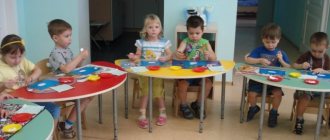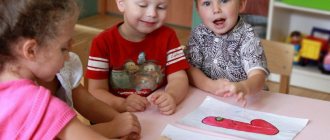Games to develop theatrical and creative abilities
Some parents believe that only future actors need theatrical abilities. It's not like that at all. Shakespeare said that life is just a big theater and we are all actors on stage in it. Sociologists will tell you without any philosophy (for this is a fact established by science) that a person plays very specific roles throughout his life, constantly changing them. For example, in the morning we wake up, begin to play the role of “woke parents”, then we play various professional roles, then, say, we come to the theater and play the role of... a spectator (this is also a role!). Without the ability to role-play, communication can be difficult because the people around you and your child are guided by a certain type of standard of behavior set by the role. So, it is absolutely necessary that your child acquires some degree of skill as a professional actor. The best games here are those that are used for teaching in acting studios and schools. Here are some of them. Of course, the main role of your child, while he is not yet grown up, will be the role of “child”. And let it be better to play the role of a “good child” than the role of a “bad child”!
Living sculpture
- Develops artistic taste, the ability to move, relieves tension. Parents' participation in the game brings them closer to their children.
- They play to music. Before the game starts, children are divided into pairs. In each pair, one is the Sculptor, the other is Clay. Clay squats down and relaxes.
- The sculptor begins to “sculpt” the sculpture. The clay gives in to any of his movements and freezes in the position that the Sculptor gives it.
- When the music ends, the sculpture is considered ready. Everyone looks at each other, see who “blinded”. Then the Sculptor and Clay change roles.
Pump and ball
- Two people play, the rest watch. Then another couple can “perform.”
- One is a “big inflatable ball”, the other “inflates” this ball with a pump. The ball stands with its whole body limp, on half-bent legs; hands hang. (“The ball is not filled with air.”) The friend begins to inflate it, accompanying the movements of his hands (pumping the air with a pump) with the sound “ssss.” With each “air supply” the ball inflates more and more….
- But the “pump” stopped pumping. “The hose is pulled out” and... air “comes out” with force from the Ball with the sound “sh-sh-sh-sh”. The body went limp again and returned to its original state.
- You can form a jury of guys who will determine the winner.
Shadow.
- The game develops the ability to concentrate, the ability to copy movements (the basis of any study).
- Two children (and an adult) participate. They play to music.
- The players imagine that one child is walking across the field, picking a flower on the side of the road, picking up a beautiful pebble, hiding from the wind, maybe jumping on one leg, etc. The second child plays his shadow. He must repeat all his movements after him.
- Then the players change places.
Village.
- The game develops attention, the ability to transform, and hearing.
- An adult plays with a group of little friends. You need a piano that you don't have to know how to play.
- At the command “Step by step!” the children begin to march.
- The presenter presses the keys.
If a lower register note sounds, the children turn into a “weeping willow” (feet shoulder-width apart, arms slightly apart at the elbows and hanging, head tilted to the shoulder). If a note of the upper register sounds, the children become a poplar, heels together, toes apart, hands raised up, look at the fingers). If a note sounds in the middle register, the children turn into a Christmas tree (legs together, arms down and to the sides at an angle).
Mirror Kingdom.
- A movement imitation game with many participants.
Conducted to music.
- All children (except for one - the driver) stand in different places in the room and are turned in different directions. These are “mirrors”.
- The driver walks around the room, and if he finds himself in front of one or another “mirror”, they should reflect his movements (without moving from their place).
- If someone fails to do this or he gapes, then the “sorceress” takes him “captive” and he is placed in “Through the Looking Glass”...
- The game ends with the music.
Blind Raven.
- This version of blind man's buff, which teaches onomatopoeia.
- One of the players is blindfolded and becomes the Blind Raven. He walks and flaps his winged arms. In addition, he sings: “If I catch you, you will become a blind raven.”
- Those playing around him scream in different bird voices.
- If the Blind Raven touches someone with its “wings”, then that person becomes a new Blind Raven.
You are my mirror.
- This fun game develops the concept of symmetry and imitation skills.
- Two players sit opposite each other.
- One makes movements with his hands - lifts, lowers, scratches behind the ear, etc. The second plays the role of a mirror and repeats all the movements of the first.
- He loses if he makes the wrong move. After this, the players change roles.
Facial expressions and gestures.
- The game develops the ability for expressive gestures.
- All players are divided into two teams.
- They are thinking of some proverbs. Then they try to convey them to each other using gestures.
- If there are four players, the game can be organized like this: the first pair thinks of a proverb, writes it down and passes it on to one player from the second pair. He tries to transfer it with gestures to the second player of his pair. Then the couples switch roles
. Living pictures.
- Develops acting skills.
- The players are divided into two teams. There must be a jury. To play you also need an album of works of Russian or world painting.
- Each group chooses a painting that it will “revive.” The groups retire for rehearsal.
- Each group then presents an animation of the painting. The characters come to life, say something, then freeze.
- The jury gives the assessment.
Convey with gestures.
- The game develops the ability to gesture
- The players are divided into pairs (transmitting - receiving). Teams come up with some concepts (words) for the opposing teams and communicate them to the transmitters of these teams (secretly from the receivers).
- The transmitters must take turns trying to convey this concept (word) to their receivers. But at the same time they can only use gestures. Not a single word can be said.
- The winner is the team that first guessed the word intended by their opponents.
Creative tasks.
You can use the proposed options for creative tasks at your discretion in a game of forfeits, in impromptu concerts, or in games that no one has yet invented. 1. Imagine and imagine:
- hot iron; - alarm; - kettle; - telephone; - coffee grinder.
or other objects surrounding you in apartments, or better yet, guess what is depicted.
2. Try to imitate the gait:
- a person who has just had a good lunch; - a person whose shoes are too tight; - a man who unsuccessfully kicked a brick; - a person who has an acute attack of radiculitis; - a man who found himself in the forest at night.
3. Imagine and depict (with facial expressions, gait, sounds):
- an anxious cat; - sad penguin; - an enthusiastic rabbit; - gloomy eagle; - an angry pig.
4. Remember what it looks like and depict the architectural structures “calling cards” of some countries:
- Egyptian pyramids; - Eiffel Tower; - Statue of Liberty; - Leaning Tower of Pisa; — The Great Wall of China.
5. Imagine that you are animals who love music but cannot speak humanly. Introduced? And now the song “Moscow Nights” in chorus:
- meow; - hum; - cluck and crow; - quack; - bark.
If you liked it, perform another song.
6. Draw a plant or creature that never existed. You can draw in parts without looking at what was drawn before you,
- the first one draws the head; - the second - to the waist; - third - from the waist to the knees; - fourth - legs; — the fifth comes up with a name and biography for the creature that came out.
7. Read one of A. Barto’s children’s poems (for example, “The bull goes rocking”), but not the way you usually read - with expression, but as if:
- you are making excuses to your friend; - you are offended by your grandmother; - you are showing off to someone; - you were angry with your little brother; - you were scared of the dog, - in a whisper, as if someone was sleeping; - like a robot; - at a snail's pace; — at machine-gun speed; - like a five-year-old child; - with maximum volume, like at a rally; - as if you were terribly cold; - like a horse that has just learned to speak; - as if you have a hot potato in your mouth; - as if you are saying the “last word” in court.
8. Say some simple phrase, for example, “Apples were falling in the garden,” one by one. Each new participant speaks with a new intonation; you cannot repeat yourself. Intonations can be the same as in the previous task or the following: angry, briefly, stuttering, tender, mournful, thoughtful, affirmative, like “no,” surprised, defiant, disappointed, like the beginning of a mysterious story, etc.
9. Perform the song “A Christmas tree was born in the forest” or “A birch tree stood in the field”, as if you:
- African aborigines; - Indian yogis; - mountaineers of the Caucasus; — reindeer herders of Chukotka; - Apache Indians; - kindergarten choir; - Song and Dance Ensemble named after. Alexandrova; — Cossack Kuban choir; - Theological Seminary Choir.
10. Draw a proverb:
- “Don’t open your mouth to someone else’s loaf”; - “If you chase two hares, you won’t catch either”; - "They do not look at a given horse's teeth"; - "One head it's good, but two better"; - “A kind word also pleases the cat.”
11. Come up with as many new uses as possible for an old, useless item:
- an empty tin can; - a holey sock; - a burst balloon; — a burnt out light bulb; - an empty pen refill.
12. Sit on a chair. Now, without leaving your chair, sit as you sit:
- chairman of the examination committee; - a monkey copying you; - cashier at his workplace; - a cat walking by itself; - beaten dog; - bee on a flower; - a triumphant dog; - pig on a cactus; - bride at a wedding; - Hamlet, Prince of Denmark.
13. Imagine yourself as a toy man. Walk around the room as if you were:
- glass; - rubber, inflated like a balloon; - cast iron; - wooden; - plush.
14. You know that objects are often used during the dance: balls, balls, ribbons (there is even a “Sabre Dance”), and you come up with a dance:
- with a mop; - with a chair; - with a kettle; - with a suitcase; - with pillow
and with anything else.
15. Take a newspaper and make up a short story from the newspaper headlines. To make the story easier to compose, headings can be cut out.
16. Everyone knows the “Dance of the Little Ducklings,” in which the movements resemble a duckling opening its beak, flapping its wings and tail. And you try to come up with a dance using the same melody with the movements of other animals and perform it. You will get:
- dance of little kittens, - dance of little puppies; - dance of little foals; - dance of little piglets; - dance of little monkeys.
17. Any phrase in Russian can be said in other words. Try saying the following sentences differently, without repeating a single word, but maintaining the meaning:
— A fly landed on the jam; — There is a glass on the table; — The clock strikes 12 times; — A sparrow flew into the window; — The detachment was walking along the shore
18. Compose 2 lines to make a funny quatrain:
- A dog was walking along the piano, saying something like this... - Did you hear, at the market, they were selling the Miracle Bird... - An elephant is crying at the zoo, He saw a mouse... - The people are surprised, Why is Fedot angry? — The Tsar issued the following decree: “To all boyars at the same hour...”
19. Come up with a new ending to the fairy tale:
- “Kolobok”; - "Chicken - Ryaba"; — “Teremok”; - “Turnip”; - "Princess Frog".
20. Write a story about:
- a dog that lived in the refrigerator; - a crow who loved to ride a bicycle; - a pike that plays the guitar; - a birch tree that dreamed of learning to swim; - a cockchafer who was very afraid of heights.
21. Try to retell some of the fairy tales of Charles Perrault, but you must have a new character present and act:
- in the fairy tale “Little Red Riding Hood” - a traffic light; - in the fairy tale “Puss in Boots” - a drill; - in the fairy tale "Cinderella" - a bulldozer; - in the fairy tale “Bluebeard” - a radio receiver; — in the fairy tale “Tom Thumb” — a fire engine.
22. Everyone has been familiar with international holidays since childhood (International Women's Day; Workers' Solidarity Day, Days of Museums and Related Cities). To mark these days, banners with slogans are hung in our cities. Suggest five slogans that could decorate your city if you approved:
— International Day Against Nose Picking; — World Gastronomy Day; — International Day of Dishes Collection Points; — World Day of Retired People; — Day of international solidarity of those standing in line.
23. Play out a situation in which journalists interview extraordinary personalities:
— professional, hereditary pasta blower; - a famous fortune teller using coffee grounds; — virtuoso playing aluminum spoons; — leader of the movement of permanent non-connection to the power line; - record holder for springboard jumping on the pelvis.
24. Make a model (or you can develop a position) of the order, which is awarded to those who:
— never swore in line; — still believes in a bright future, — feels satisfaction from riding in public transport; - regularly reads the newspaper Pravda from the first to the last line; — never once mentioned the President with an unkind word.
25. Draw a beautiful medal that could be given to friends for special achievements, for example:
- for love of chocolate, - for better puddle ability; - for speed tying; — for safe sliding of the railing; - for bun absorption.
26. Compose and deliver a eulogy for the characters in I.A.’s fables. Krylov, who takes an active position in his life:
— Moska — for his courage in criticizing higher authorities; — Swan, Cancer and Pike — for their integrity in upholding their life beliefs; — Ant — for the consistent fight against parasites; - Vodka - for the decisive fight against turbidity and pollution of streams and other bodies of water; — Lisya — for the fight against the facts of illegal acquisition of food.
27. Compose and deliver an indictment speech against some literary characters who violate laws and regulations:
- old woman Shapoklyak - for walking rats in public places; - Alice the Fox and Basilio the Cat - for involving minors in currency fraud; - Emele - for fishing using prohibited methods; - postman Pechkin - for receiving gifts while on duty; - Carlson - for living without registration and without certain activities.
28. Imagine that a sculpture gallery with the strange name “Victims of Sports” has been opened. Create sculptural compositions with titles for this gallery:
- a weightlifter who did not have time to jump away from the barbell; - the goalkeeper who caught the puck with his teeth; - a parachutist who forgot what to pull; - a gymnast who did not come out of a triple pirouette in time; - a skier who did not have time to escape from an avalanche.
29. Create a monument to a literary hero and give a speech at its unveiling:
- “To the first collector of waste materials in Russia - Plyushkin”; — “To the first activist of OSVOD - grandfather Mazai”; — “To the first representative of the Red Cross in Africa - Doctor Aibolit”; - “To the first organizer of competitions with evil spirits - Balda”; - “To the first aeronaut in a balloon - Winnie the Pooh.”
"Living Pictures"
This game was very loved by our grandmothers. But it is no less interesting now. “Revitalizing paintings” not only increases erudition in the field of fine arts, but also provides an excellent opportunity to show your imagination, ingenuity and sense of humor. The game requires some preliminary preparation: you need to choose the plot of a famous work of painting or sculpture and, using available means, try to imagine it, freezing for a few seconds. The rest must guess what kind of picture they wanted to depict and who its author was. Such masterpieces as “Bogatyrs”, “Tea Party in Mytishchi”, “Deuce Again”, “Ivan the Terrible and His Son Ivan” and many other genre paintings up to “Morning in a Pine Forest” and “Morning of the Streltsy” beg to be “revived” execution."
Exercise “Like Julius Caesar”
Being able to concentrate on what you are doing is very important for every person, but for an actor it plays a special role. If your child attends drama classes, he or she has probably been given several exercises to improve concentration and attention. Here's another one. Its essence is to do two things at the same time: for example, read to music. If this is too easy, ask your child to recite a poem to music. The task is not to get lost. Remember, there will always be extraneous noise in a theater or concert hall. It should not distract the actor. The quality of his performance and career depend on the speed of his thinking, attention, and ability to concentrate.
Exercise “Repeat”
This task is popular in acting schools for adults and children, not only in Russia and Moscow, but all over the world. The task is simple: turn on any episode of the film, and the child tries to repeat the character’s gestures, facial expressions, and intonations. Even professional actors don’t get it right the first time, but the more children practice, the better they will get at it. Each time they begin to see new shades of speech and behavior of the character. This helps develop the powers of observation and observation that every actor needs.
The Center for the Development of Successful Children "Names Production" reveals children's talents! Our developmental children's center has a theater studio for children from 3 to 16 years old. Our teachers are engaged in the comprehensive development of the acting talent of students, helping everyone find their own unique style and build an individual path to the profession. Our students star in films and commercials, take part in the “View from Below” show, and participate in the annual charity concert “I Believe!”
We invite your children to our classes!




